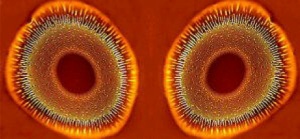Sep 11 2013
Scientists from the National Physical Laboratory (NPL) have contributed nanoscale images of bleached hair, gold nanoparticles and the impact of cluster guns to the Guardian's nanotechnology blog, Small World.
 One of the NPL images shows nano-structures created by blasting carbon-containing molecules with bismuth atoms
One of the NPL images shows nano-structures created by blasting carbon-containing molecules with bismuth atoms
The blog, in association with an EC-funded project called Nanopinion, aims to discuss advances in nanotechnology. It features a monthly gallery called 'Postcards from the nanoworld', which brings together the most picturesque and interesting images at the nanoscale. Three images from NPL appear in this month's series.
The first is a mirrored image taken by an atomic force microscope (AFM). The nano-structures were created by putting a 100 nm layer of complex carbon-containing molecules (Irganox) on silicon, then blasting the surface with electrically-charged clusters of bismuth atoms. These cluster guns are being used by scientists at NPL to map surface chemistry in three dimensions.
The second shows gold nanoparticles gathering at the atomic steps of graphite. Scientists at NPL are using well-understood nanoparticles to measure the sharpness of the probe tip of their AFM.
The final set of images shows the difference between untreated and heavily bleached hair as measured by NPL's AFM. The untreated hair shows layers, called cuticles, separated by nanoscale steps. The process of bleaching totally removes these steps, as can be seen in the second image, damaging the hair and leaving behind a rough surface.